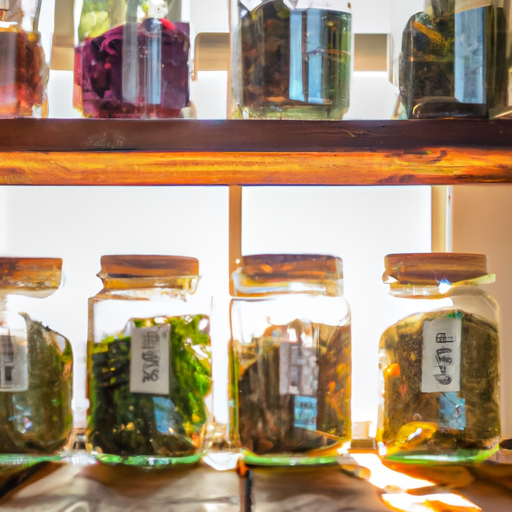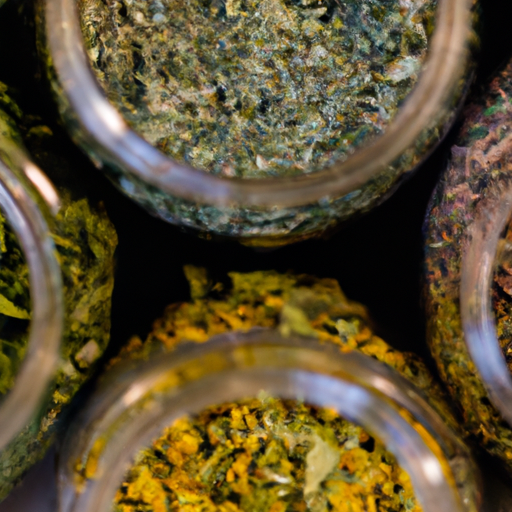Did you know that approximately 70 million people in the United States suffer from digestive disorders?
If you’re one of them, you understand the discomfort and frustration that comes with an unsettled stomach. Thankfully, there is a natural and soothing solution: herbal teas.
These teas have been used for centuries to alleviate digestive issues and promote overall wellness. In this article, I will guide you through the world of herbal teas that specifically target stomach discomfort. Whether it’s the refreshing taste of peppermint, the warming properties of ginger, or the calming effects of chamomile, there is a tea out there that can settle your stomach and bring you relief.
So sit back, relax, and let’s explore the wonders of herbal teas that can provide you with a holistic approach to digestive health.
Key Takeaways
- Peppermint tea can calm digestive discomfort, reduce bloating, gas, stomach cramps, and has antimicrobial properties.
- Ginger tea settles upset stomachs, relieves nausea, reduces inflammation, improves digestion, and boosts immunity.
- Chamomile tea has anti-inflammatory and anti-spasmodic properties, calms the digestive system, reduces bloating, aids digestion, promotes relaxation, eases stress, and improves sleep quality.
- Fennel tea relieves bloating, gas, eases indigestion, alleviates stomach cramps, and reduces inflammation.
Peppermint Tea
Looking for a natural remedy to soothe your upset stomach? Look no further than peppermint tea, the herbal elixir that’s been trusted for centuries to calm digestive discomfort.
Peppermint tea is not only delicious, but it also offers numerous health benefits. The menthol in peppermint has been shown to relax the muscles of the gastrointestinal tract, reducing symptoms such as bloating, gas, and stomach cramps. Additionally, peppermint tea has been found to have antimicrobial properties, which can help combat harmful bacteria in the digestive system.
To brew the perfect cup of peppermint tea, start by boiling water and pouring it over a peppermint tea bag or a handful of fresh peppermint leaves. Let it steep for about 5-10 minutes to ensure maximum flavor and health benefits. You can sweeten it with honey or a splash of lemon juice if desired. Sip it slowly and enjoy the calming effects on your stomach.
Now, let’s move on to ginger tea, another herbal remedy that can settle the stomach and provide relief from digestive issues.
Ginger Tea
Feeling a wave of relief wash over you, sipping on a steaming cup of ginger-infused goodness is like being wrapped in a cozy blanket on a stormy day. Ginger tea has been used for centuries to settle upset stomachs and ease digestive discomfort. Its natural compounds, such as gingerol and shogaol, have anti-inflammatory and anti-nausea properties that can soothe an upset stomach and promote overall digestive health.
Here are some benefits of ginger tea:
-
Relieves nausea: Ginger tea is a popular remedy for morning sickness, motion sickness, and nausea caused by chemotherapy. Its compounds work by blocking certain signals in the brain that trigger nausea.
-
Reduces inflammation: Chronic inflammation in the digestive system can lead to various digestive disorders. The anti-inflammatory properties of ginger can help reduce inflammation and promote a healthy digestive system.
-
Improves digestion: Ginger tea stimulates the production of digestive enzymes, which aids in the breakdown and absorption of nutrients. It also helps to relax the muscles of the gastrointestinal tract, promoting smooth digestion.
-
Boosts immunity: Ginger tea contains antioxidants that help strengthen the immune system, protecting the body against infections and diseases.
To make ginger tea, simply steep 1-2 teaspoons of freshly grated ginger in a cup of hot water for 10 minutes. You can add honey or lemon for added flavor.
Transitioning into the subsequent section about chamomile tea, another herbal tea known for its stomach-soothing properties, it’s important to explore its benefits as well.
Chamomile Tea
Indulge in the soothing properties of chamomile, as a warm cup of this gentle infusion calms your digestive system and promotes overall well-being. Chamomile tea has been used for centuries for its numerous health benefits, including its ability to settle the stomach and alleviate digestive issues.
Chamomile tea is known for its anti-inflammatory and anti-spasmodic properties, which can help relieve stomach discomfort and reduce bloating. It contains compounds like flavonoids and terpenoids that have a calming effect on the muscles of the digestive tract, easing digestion and reducing the risk of indigestion. Additionally, chamomile tea has been found to have a mild sedative effect, making it a popular choice for promoting relaxation and sleep.
To give you a better idea of the benefits of chamomile tea, here is a table highlighting some of its key properties:
| Property | Description |
|---|---|
| Anti-inflammatory | Reduces inflammation in the digestive system |
| Anti-spasmodic | Relieves stomach cramps and spasms |
| Calming | Promotes relaxation and eases stress |
| Digestive aid | Soothes the digestive tract and aids in digestion |
| Sleep aid | Helps improve sleep quality and promotes a restful night’s sleep |
As we transition into the next section about fennel tea, it’s important to note that fennel tea is another herbal remedy known for its stomach-settling properties.
Fennel Tea
Take a moment to savor the aromatic delight of fennel tea, which works wonders in soothing your digestive system and promoting overall well-being. Fennel tea, made from the seeds of the fennel plant, has been used for centuries as a natural remedy for various digestive issues. It’s known for its numerous benefits for digestion and can be easily made at home.
Benefits of fennel tea for digestion:
- Relieves bloating and gas: Fennel tea has carminative properties that help relax the muscles in the gastrointestinal tract, reducing bloating and relieving gas.
- Eases indigestion: The compounds in fennel tea stimulate the production of digestive enzymes, aiding in the breakdown of food and easing indigestion.
- Alleviates stomach cramps: Fennel tea has antispasmodic properties that can help relax the muscles in the stomach, providing relief from stomach cramps.
- Reduces inflammation: Fennel tea contains antioxidants and anti-inflammatory compounds that can help reduce inflammation in the digestive system, soothing discomfort.
To make fennel tea at home, simply steep one teaspoon of crushed fennel seeds in a cup of hot water for about 10 minutes. Strain and enjoy.
Moving on to lemon balm tea, let’s explore another herbal remedy for soothing the stomach.
Lemon Balm Tea
Lemon balm tea, with its citrusy aroma and soothing properties, transports your taste buds to a tranquil garden, where relaxation and comfort abound. This delightful herbal tea not only offers a refreshing taste, but also provides a range of benefits for your stomach and overall well-being.
One of the key lemon balm tea benefits is its ability to settle the stomach. It’s been used for centuries to ease digestive discomfort, including bloating, gas, and indigestion. Lemon balm contains certain compounds that help relax the muscles in the digestive tract, promoting smoother digestion and reducing discomfort.
To make lemon balm tea, simply steep a handful of fresh lemon balm leaves or a teaspoon of dried leaves in hot water for about 5-10 minutes. You can also add a touch of honey for sweetness, if you’d like. Sip on this aromatic infusion after a meal or whenever you need a calming cup of tea.
Now, let’s move on to the next herbal tea that can provide relief for your stomach – licorice root tea. With its distinct flavor and soothing properties, licorice root tea can offer a natural solution for various digestive issues.
Licorice Root Tea
Moving on from the previous subtopic of Lemon Balm Tea, let’s explore the benefits of Licorice Root Tea in settling the stomach. Licorice root, derived from the Glycyrrhiza glabra plant, has been used for centuries in traditional medicine for its numerous health benefits. When it comes to digestive health, licorice root tea is known for its soothing properties.
Licorice root tea contains compounds that can help reduce inflammation and irritation in the stomach lining, making it a great option for those experiencing stomach discomfort or indigestion. Additionally, licorice root tea has been found to stimulate the production of protective mucus in the stomach, which can help prevent ulcers and promote healing.
However, it’s important to note that licorice root tea should be consumed in moderation. Excessive consumption of licorice root can lead to side effects such as high blood pressure and low potassium levels. It’s always best to consult with a healthcare professional before incorporating licorice root tea into your routine, especially if you have any pre-existing medical conditions or are taking medications.
Now, let’s delve into the next subtopic: Dandelion Root Tea, and discover its potential benefits for settling the stomach.
Dandelion Root Tea
Dandelion root tea, with its earthy flavor and vibrant yellow color, offers potential benefits for soothing and calming the digestive system. This herbal tea has been used for centuries in traditional medicine to promote overall health and well-being.
Here are some of the health benefits of dandelion root tea:
-
Digestive Aid: Dandelion root tea can help stimulate digestion and relieve symptoms such as bloating, gas, and indigestion. It acts as a mild laxative, promoting bowel movements and reducing constipation.
-
Liver Support: Dandelion root tea is known for its liver-detoxifying properties. It helps cleanse and support the liver, aiding in the removal of toxins from the body.
-
Anti-inflammatory Effects: Dandelion root tea contains antioxidants and anti-inflammatory compounds that may help reduce inflammation in the body, including the digestive system. This can be beneficial for individuals experiencing stomach discomfort or irritation.
Making dandelion root tea at home is simple. Here’s a basic recipe:
- Gather fresh dandelion roots or use dried roots.
- Clean the roots thoroughly and chop them into small pieces.
- Boil water and add the dandelion roots.
- Let it simmer for 15-20 minutes.
- Strain the tea and enjoy it warm.
Remember to consult with a healthcare professional before incorporating dandelion root tea into your routine, especially if you have any pre-existing health conditions or are taking medication.
Frequently Asked Questions
Are there any potential side effects or risks associated with drinking herbal teas for stomach settlement?
There are potential long term effects of consuming herbal teas for stomach settlement, such as liver damage or allergic reactions. Research on the effectiveness of different herbal teas is limited, so it’s important to consult with a healthcare professional.
Can pregnant women safely consume these herbal teas to settle their stomachs?
Pregnant women may safely consume certain herbal teas to settle their stomachs. Some alternatives include ginger, peppermint, and chamomile. These teas have been found effective in relieving morning sickness during pregnancy, based on evidence-based research.
How long does it typically take for these herbal teas to take effect and provide relief for an upset stomach?
Herbal teas work wonders for upset stomachs! The best ones for quick relief are ginger and peppermint. Within 15-20 minutes, you’ll feel better as they help soothe digestion and reduce inflammation.
Are there any specific dosages or recommended amounts of herbal tea that one should consume to settle the stomach?
When it comes to settling the stomach, it’s important to consider the dosages and effectiveness of herbal tea. It’s recommended to follow the instructions on the packaging or consult a healthcare professional for proper usage.
Can these herbal teas be used to alleviate other digestive issues, such as bloating or indigestion, or are they primarily effective for stomach settling only?
Herbal teas can alleviate various digestive issues like bloating and indigestion. They work wonders by soothing the stomach and promoting healthy digestion. These natural remedies are a great choice for those seeking holistic relief.
Conclusion
After exploring various herbal teas that can settle the stomach, it’s clear that nature holds the key to our digestive comfort. From the soothing aroma of peppermint tea to the warming qualities of ginger tea, these natural remedies provide a holistic approach to stomach health.
Chamomile tea offers a gentle embrace for our troubled tummies, while fennel tea aids in digestion. Lemon balm tea brings a burst of freshness, and licorice root tea calms the stomach with its licoricey goodness. Finally, dandelion root tea detoxifies and promotes a healthy gut.
Embrace the power of herbal teas and let nature soothe your stomach woes.










